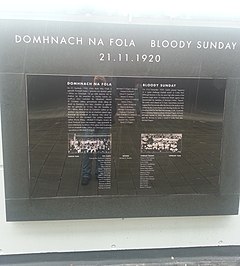Joseph John O'Connor (Irish Seosamh Ó Conchobhair), (c.1880 – 6 April 1941) was an Irish revolutionary, soldier and politician.
O'Connor was born in the 1880s and remembered seeing Charles Stewart Parnell as a child. He joined the Irish Volunteers in 1913 and by 1916 he was a captain in command of A Company, 3rd Battalion, Dublin Brigade under Éamon de Valera. When the vice-commandant failed to show for the 1916 Easter Rising de Valera made O'Connor his second in command. O'Connor remained with his company and de Valera at Bolands Mill until they became the last battalion to surrender. He was imprisoned at Frongoch internment camp in Wales and released in the 1917 amnesty.

Charles Stewart Parnell was an Irish nationalist politician who served from 1875 as Member of Parliament (MP) in the House of Commons of the United Kingdom of Great Britain and Ireland, and whose party held the balance of power in the House of Commons during the Home Rule debates of 1885-1890.

The Irish Volunteers, sometimes called the Irish Volunteer Force or Irish Volunteer Army, was a military organisation established in 1913 by Irish nationalists. It was ostensibly formed in response to the formation of the Ulster Volunteers in 1912, and its declared primary aim was "to secure and maintain the rights and liberties common to the whole people of Ireland". The Volunteers included members of the Gaelic League, Ancient Order of Hibernians and Sinn Féin, and, secretly, the Irish Republican Brotherhood (IRB). Increasing rapidly to a strength of nearly 200,000 by mid-1914, it split in September of that year over John Redmond's commitment to the British War effort, with the smaller group retaining the name of "Irish Volunteers".

Éamon de Valera was a prominent statesman and political leader in 20th-century Ireland. His political career spanned over half a century, from 1917 to 1973; he served several terms as head of government and head of state. He also led the introduction of the Constitution of Ireland.
Returning to Dublin O'Connor joined "The Squad" under Michael Collins and killed Captain John FitzGerald of the "Cairo Gang" on Bloody Sunday in 1920. By the end of the Irish War of Independence he was Commandant of the 3rd Battalion "Dev's Own". He was a member of the Irish Republican Army's "Banned Convention" in 1922 and in the Battle of Dublin during the Irish Civil War he held the Fianna HQ in York Street near St Stephen's Green. He escaped to Limerick and succeeded Ernie O'Malley as the Quarter-Master-General of the IRA with the rank of brigadier-general.

Michael Collins was an Irish revolutionary, soldier and politician who was a leading figure in the early-20th-century Irish struggle for independence. He was Chairman of the Provisional Government of the Irish Free State from January 1922 until his assassination in August 1922.

Bloody Sunday was a day of violence in Dublin on 21 November 1920, during the Irish War of Independence. Thirty-two people were killed or fatally wounded: thirteen British soldiers and police, sixteen Irish civilians, and three Irish republican prisoners.

The Irish War of Independence or Anglo-Irish War was a guerrilla war fought in Ireland from 1919 to 1921 between the Irish Republican Army and British forces: the British Army, along with the quasi-military Royal Irish Constabulary (RIC) and its paramilitary forces the Auxiliaries and Ulster Special Constabulary (USC). It was an escalation of the Irish revolutionary period into warfare.
After the Civil War he became a cattle salesman and farmer. At the 1925 Seanad election, he was elected as a Cumann na nGaedheal senator, serving until 1936. [1] Despite joining Fine Gael he presented de Valera with a scroll of those killed in the Easter Rising in a 20th anniversary remembrance. [2] He also sued O'Malley in 1936 when his memoirs accused O'Connor of cowardice and he won £550 in damages. [3]
Cumann na nGaedheal, sometimes spelt Cumann na nGaedhael, was a political party in the Irish Free State, which formed the government from 1923 to 1932. In 1933 it merged with smaller groups to form the Fine Gael party.

Fine Gael is a liberal-conservative political party in Ireland. Fine Gael is currently the governing and largest party in Ireland in terms of members of the Oireachtas and Irish members of European Parliament. The party has a membership of 21,000 and is the senior partner governing in a minority coalition with several independent politicians, with party leader Leo Varadkar serving as Taoiseach. Varadkar succeeded Enda Kenny as party leader on 2 June 2017 and as Taoiseach on 14 June; Kenny had been leader since 2002, and Taoiseach since 2011.

